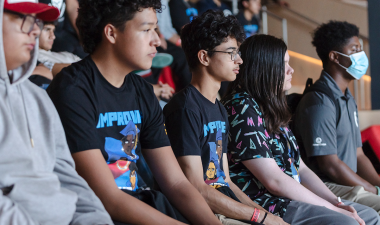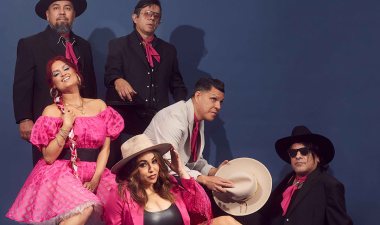In planning Stanislaus State’s fourth annual Black Power Matters event in celebration of Black History Month on Feb. 18, organizer Mary Roaf invited Michael Baldwin to be a panelist, having seen him serve as master of ceremonies at the Modesto NAACP Kwanzaa celebration, and more recently, seeing an Instagram video of him speaking to Stan State’s Project Rebound students.
Baldwin accepted without reservation, only to learn later the theme is Knowledge, Truth and Liberation.
“I didn’t know, but I really like those,” Baldwin said. “I might have a different way of seeing those things.”
Roaf, whose Ethnic Studies Department sponsors the 6-8 p.m. virtual event in coordination with the Black Student Union and Black Faculty and Staff Association, expects different perspectives from all the panelists.
“What I really want is to see what roles knowledge and truth played in their individual liberation,” Roaf said.
Joining Baldwin are Rawiyah Tariq and Miss Marianna.
“A lot of people say knowledge is power. I believe knowledge is potential power. It’s not power by itself. It’s only potential power. We still have to use it."
-Michael Baldwin
Tariq self-describes as a Black, gender non-binary, fat, disabled and neurodivergent artist and kink aware professional. Their roots are in queer, poly-amorous, fat community, and their tone is reflective of those roots. Their work is informed by how these intersect with their Blackness.
Tariq uses magic, massage, storytelling and performance art to liberate, heal and reclaim space for marginalized communities.
Miss Marianna is an emotional hygienist, edutainment specialist and author who has helped individuals, schools, businesses and civic institutions address such issues as community and family engagement, public health and safety, trauma-informed care, implicit bias, diversity, equity and inclusion, restorative justice, overcoming domestic violence and community activism.
Baldwin’s perspective comes from overcoming a traumatized youth — a violent home and sexual abuse from ages 6 to 9 in his native Chicago, and heroin addiction beginning when he was 15 — to freedom after 26 years in prison following his arrest at the age of 20 in El Dorado County on a drug deal gone bad.
“A lot of people say knowledge is power,” Baldwin said. “I believe knowledge is potential power. It’s not power by itself. It’s only potential power. We still have to use it.
“I believe there’s a way for us to talk about these three areas, and how I’ve been able to apply them to my life and my employees, now. People misuse knowledge. They depend upon everyone to give them knowledge instead of investigating something for themselves.”
Baldwin made use of educational opportunities while in prison, and when college courses were no longer available, he read as much as he could. The result is that when he was set free on Oct. 22, 2018, after 26 years, seven months and 17 days, he was ready to contribute to the world in a meaningful way.
He could work as a paralegal, start two companies — a consulting firm that works with police departments and school districts, and a nonprofit that serves the formerly incarcerated, at-risk youth, homeless and victims of domestic violence — and become the chair of the social justice branch of the Modesto NAACP, because the knowledge he’d acquired in prison included learning about himself.
“We think our nation’s prisons are filled with bad people, when in reality, prisons are filled with a lot of hurt people,” Baldwin said. “Our nation’s prisons are not rehabilitators. When we see someone come home and they misbehave, we think, ‘Didn’t they get the help they needed?’ No, they didn’t get help inside, and if they did, it came from another inmate, not from some professional you pay a lot of money to be there. It came from someone with a lived experience able to tell them from their own life what works and what doesn’t.”
While in prison, a fellow inmate asked Baldwin, “Who hurt you?”
“That was the first time that change started happening for me,” he said. “I had never had anybody in my entire life ask me who hurt me. That guy changed my life with that question.”
Understanding that answer enabled Baldwin to realize how he ended up hooked on heroin. It was a means of escaping life’s pain. A year after moving to California with his girlfriend and two of his six children, he was introduced to methamphetamine. He’d kicked heroin at rehab and figured he’d be OK as long as he didn’t go back to that drug.
“I had someone offer me methamphetamine, and he asked me to help him get some money from people who had robbed him,” Baldwin said. “He used me as a weapon. I had no idea what methamphetamine would do to me. I had a misunderstanding of what addiction was. I had a misunderstanding of who I was. I went and I committed this crime with this gentleman and his girlfriend. They were Caucasian. I was Black. I was in El Dorado County. I was out of bounds.
“I pled guilty to kidnap, robbery and attempted rape, because they told me I would do 10 years. That isn’t what happened, but I pleaded guilty, and they gave me two life sentences. I went inside the California Department of Corrections and Rehabilitation in shock and disarray. It was my first time ever in prison or in trouble with the law. It was my first time ever in handcuffs. It took me five, maybe six years before I could even shake the cobwebs off and realize what happened. At that moment I realized I was in a space I wasn’t supposed to be in.”
He used his time to learn who he was. And about a lot of other things. He studied behavioral therapy. He said he helped educate others. Part of his work continues to be promoting higher education.
He’s partial to helping those who’ve been incarcerated, but he doesn’t limit his outreach.
Baldwin has a wide lens of observation and is excited to share it during Black Power Matters.
“Just the name was enough for me,” he said about receiving Roaf’s emailed invitation. “Sometimes when we think Black lives, we separate them from Black power. Black Power matters. Those are two different things. We can have a life, but if we have no power, we have no life. I just thought it was an interesting play with words. Whenever I get the opportunity, I share with people some of my life’s journey and the power of redemption, the power of sacrifice, the power of second chances.”
Other Black History Month Events:
Feb. 9, Noon-3 p.m.: “You Good?” The Black Faculty and Staff Association is holding a check-in with students to make sure they’re ready for the semester and to see how they are doing and feeling.
Feb. 11, 5-7:30 p.m.: “Colin in Black and White” will feature selections for the Netflix series about the former San Francisco 49ers quarterback and Turlock product who lost his job in the NFL for taking a knee during the National Anthem to address racial injustice. Licensed counselor of social work Lisa Bonta Sumii will moderate and facilitate the discussion.



